Aristides S. Bouras - Python and Algorithmic Thinking for the Complete Beginner
Here you can read online Aristides S. Bouras - Python and Algorithmic Thinking for the Complete Beginner full text of the book (entire story) in english for free. Download pdf and epub, get meaning, cover and reviews about this ebook. genre: Home and family. Description of the work, (preface) as well as reviews are available. Best literature library LitArk.com created for fans of good reading and offers a wide selection of genres:
Romance novel
Science fiction
Adventure
Detective
Science
History
Home and family
Prose
Art
Politics
Computer
Non-fiction
Religion
Business
Children
Humor
Choose a favorite category and find really read worthwhile books. Enjoy immersion in the world of imagination, feel the emotions of the characters or learn something new for yourself, make an fascinating discovery.
- Book:Python and Algorithmic Thinking for the Complete Beginner
- Author:
- Genre:
- Rating:5 / 5
- Favourites:Add to favourites
- Your mark:
- 100
- 1
- 2
- 3
- 4
- 5
Python and Algorithmic Thinking for the Complete Beginner: summary, description and annotation
We offer to read an annotation, description, summary or preface (depends on what the author of the book "Python and Algorithmic Thinking for the Complete Beginner" wrote himself). If you haven't found the necessary information about the book — write in the comments, we will try to find it.
Python and Algorithmic Thinking for the Complete Beginner — read online for free the complete book (whole text) full work
Below is the text of the book, divided by pages. System saving the place of the last page read, allows you to conveniently read the book "Python and Algorithmic Thinking for the Complete Beginner" online for free, without having to search again every time where you left off. Put a bookmark, and you can go to the page where you finished reading at any time.
Font size:
Interval:
Bookmark:
Python and Algorithmic Thinking for the Complete Beginner
Learn to Think Like a Programmer
Revised Second Edition
By
Aristides S. Bouras
Python and Algorithmic Thinking for the Complete Beginner
Revised Second Edition
Copyright by Aristides S. Bouras
https://www.bouraspage.com
Cover illustration and design: Philippos Papanikolaou
Python and PyCon are trademarks or registered trademarks of the Python Software Foundation.
Eclipse is a trademark of the Eclipse Foundation, Inc.
All crossword puzzles were created with EclipseCrossword software powered by Green Eclipse
PyDev is a trademark of Appcelerator.
Oracle and Java are registered trademarks of Oracle and/or its affiliates.
PHP is a copyright of the PHP Group.
The following are either registered trademarks or trademarks of Microsoft Corporation in the United States and/or other countries: Microsoft, Windows, IntelliSense, SQL Server, VBA, Visual Basic, and Visual C#.
Mazda and Mazda 6 are trademarks of the Mazda Motor Corporation or its affiliated companies.
Ford and Ford Focus are trademarks of the Ford Motor Company.
Other names may be trademarks of their respective owners.
Rcode: 191218
All rights reserved. No part of this book may be reproduced or transmitted in any form or by any means, mechanical or electronic, including photocopying, recording, or by any information storage and retrieval system, without written permission from the authors.
Warning and Disclaimer
This book is designed to provide information about learning Algorithmic Thinking, mainly through the use of Python programming language. Every effort has been taken to make this book compatible with all releases of Python 3.x, and it is almost certain to be compatible with any future releases of Python.
The information is provided on an as is basis. The authors shall have neither liability nor responsibility to any person or entity with respect to any loss or damages arising from the information contained in this book or from the use of the files that may accompany it.
Aristides S. Bouras was born in 1973. During his early childhood, he discovered a love of computer programming. He got his first computer at the age of 12, a Commodore 64, which incorporated a ROM-based version of the BASIC programming language and 64 kilobytes of RAM!!!
He holds a degree in Computer Engineering from the Technological Educational Institute of Piraeus, and a Dipl. Eng. degree in Electrical and Computer Engineering from the Democritus University of Thrace.
He worked as a software developer at a company that specialized in industrial data flow and labelling of products. His main job was to develop software applications for data terminals, as well as PC software applications for collecting and storing data on a Microsoft SQL Server.
He has developed many applications such as warehouse managing systems and websites for companies and other organizations. Nowadays, he works as a high school teacher. He mainly teaches courses in computer networks, programming tools for the Internet/intranets, and databases.
He has written a number of books, mainly about algorithmic and computational thinking through the use of Python, C#, Java, C++, PHP, and Visual Basic programming languages.
He is married and he has two children.
I would like to thank, with particular gratefulness, my friend and senior editor Victoria (Vicki) Austin for her assistance in copy editing. Without her, this book might not have reached its full potential. With her patient guidance and valuable and constructive suggestions, she helped me bring this book up to a higher level!
The book you hold in your hands follows the spiral curriculum teaching approach, a method proposed in 1960 by Jerome Bruner, an American psychologist. According to this method, as a subject is being taught, basic ideas are revisited at intervalsat a more sophisticated level each timeuntil the reader achieves a complete understanding of the subject. First, the reader learns the basic elements without worrying about the details. Later, more details are taught and basic elements are mentioned again and again, eventually being stored in the brain's long term memory.
According to Jerome Bruner, learning requires the student's active participation, experimentation, exploration, and discovery. This book contains many examples, most of which can be practically performed. This gives the reader the opportunity to get his or her hands on Python and become capable of creating his or her own programs.
Thoroughly revised for the latest version of Python, this book explains basic concepts in a clear and explicit way that takes very seriously one thing for grantedthat the reader knows nothing about computer programming.
Addressed to anyone who has no prior programming knowledge or experience, but a desire to learn programming with Python, it teaches the first thing that every novice programmer needs to learn, which is Algorithmic Thinking . lgorithmic Thinking involves more than just learning code. It is a problem-solving process that involves learning how to code.
This edition contains all the popular features of the previous edition and adds a significant number of exercises, as well as extensive revisions and updates. Apart from Python's lists, it now also covers dictionaries, while a brand new section provides an effective introduction to the next field that a programmer needs to work with, which is Object Oriented Programming (OOP).
This book has a class course structure with questions and exercises at the end of each chapter so you can test what you have learned right away and improve your comprehension. With 250 solved and 450 unsolved exercises, 475 true/false, about 150 multiple choice, and 200 review questions and crosswords (the solutions and the answers to which can be found on the Internet), this book is ideal for
Following are some explanations on the conventions used in this book. Conventions refer to the standard ways in which certain parts of the text are displayed.
Python Statements
This book uses plenty of examples written in Python language. Python statements are shown in a typeface that looks like this.
Keywords, Variables, Functions, and Arguments Within the Text of a Paragraph
Keywords, variables, functions, and arguments are sometimes shown within the text of a paragraph. When they are, the special text is shown in a typeface different from that of the rest of the paragraph. For instance, first_name = 5 is an example of a Python statement within the paragraph text.
Words in Italics
You may notice that some of the special text is also displayed in italics. In this book, italicized words are general types that must be replaced with the specific name appropriate for your data. For example, the general form of a Python statement may be presented as
In order to complete the statement, the keywords name , arg1 , and arg2 must be replaced with something meaningful. When you use this statement in your program, you might use it in the following form.
Three dots (): an Ellipsis
In the general form of a statement you may also notice three dots ( ), also known as an ellipsis, following a list in an example. They are not part of the statement. An ellipsis indicates that you can have as many items in the list as you want. For example, the ellipsis in the general form of the statement
Next pageFont size:
Interval:
Bookmark:
Similar books «Python and Algorithmic Thinking for the Complete Beginner»
Look at similar books to Python and Algorithmic Thinking for the Complete Beginner. We have selected literature similar in name and meaning in the hope of providing readers with more options to find new, interesting, not yet read works.
Discussion, reviews of the book Python and Algorithmic Thinking for the Complete Beginner and just readers' own opinions. Leave your comments, write what you think about the work, its meaning or the main characters. Specify what exactly you liked and what you didn't like, and why you think so.

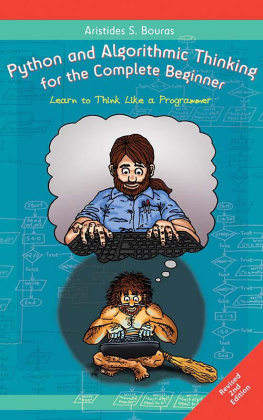

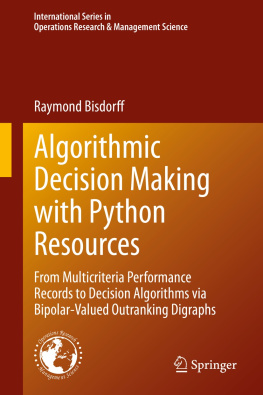
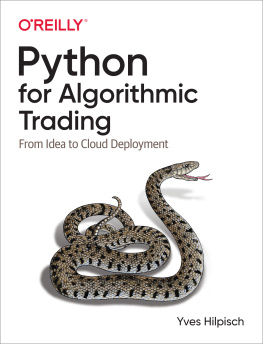
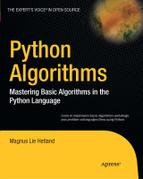
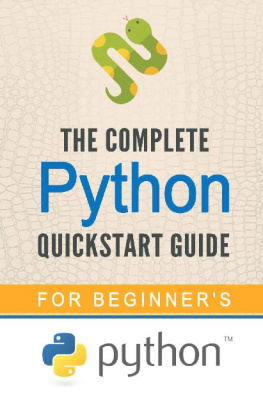
![Magnus Lie Hetland [Magnus Lie Hetland] - Python Algorithms: Mastering Basic Algorithms in the Python Language, Second Edition](/uploads/posts/book/124062/thumbs/magnus-lie-hetland-magnus-lie-hetland-python.jpg)
![Aristides Bouras - C++ and Algorithmic Thinking for the Complete Beginner: Learn to Think Like a Programmer [Part 1 of 5]](/uploads/posts/book/106120/thumbs/aristides-bouras-c-and-algorithmic-thinking-for.jpg)